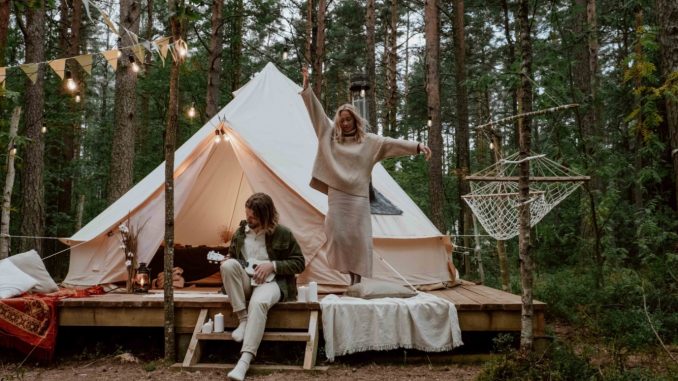
As the relaxation of COVID-19 travel restrictions and the promise of summer open Europe’s splendid natural world again to travellers—and a preference for experience-oriented trips over the acquisition of possessions rises in the priorities of well-heeled consumers—the pursuit of camping, and it’s more glamorous cousin, “glamping”, is resurging.
Stay in a cabin, pod, yurt, luxury tent, treehouse, or “Hobbit hole”
The global glamping market size is expected to reach $5.41B by 2028, expanding at a compound annual growth rate (CAGR) of 14.1% from 2021 to 2028, and heralding a readiness to pay for luxurious travel that’s symbiotic with nature.
Exotic and unconventional landscapes coupled with luxurious facilities are attracting young travellers in particular to seek out a stay in many a cabin, pod, yurt, luxury tent, treehouse, or “Hobbit hole” characterising the accommodation on offer in this sector.
Whether it’s at one of many four- and five-star French Riviera campsites, or in a treehouse in the forest near Chalais Abbey in France recommended by Forbes, there’s bound to be a destination suited to anyone and everyone’s taste, style, or budget.
Driven largely by social media and other digital advertising platforms, players are appealing to the 18- to 32-year-old age group segment dominating the market which notched up a revenue share of 44.6% in 2020, according to a report published by Kampgrounds of America, Inc.; Millennials and Gen. Z citizens, notably, accounted for 60% of the total number of leisure travellers in America in 2020.
European travel presently dominates the market, raking in a revenue share of 34.9% in 2020, while the number of glamping trips in the U.K. doubled between 2015 and 2016, up from 160,000 trips to over 325,000.
Camping companies expanding France’s glamping business
France is Europe’s leading glamping destination—ranking second in the world to the United States—and with 8,000 campsites across the country—221 rated as five-star campsites and 1,171 four-star rated glamping sites—investors have been collaborating with camping companies to expand the country’s glamping business.
The country has seen over 1,000 traditional campsites close over the past 20 years as tastes and trends shift among consumers wanting to experience a more luxurious engagement with the countryside.
The erosion of COVID-19 safety concerns into traditional hospitality offerings—such enclosed spaces like hotels and restaurants—is also contributing to the rise of camping and glamping for their ability to provide socially distant, hygienic, and secluded breaks from overcrowded cities.
